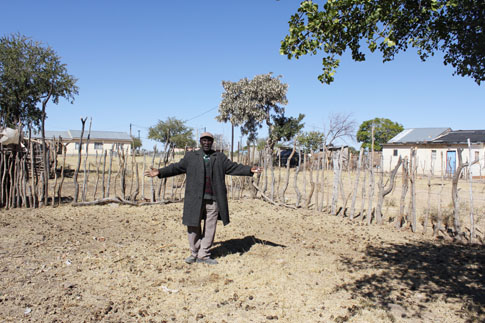Butale awaits re-stocking
01 Aug 2013
There is a deafening silence in Butale except for the usual ambience of birds singing and people talking.
But it is not until one listens intensely that they realise the absence of a sound familiar in a lot of villages throughout Botswana; the clanking sounds of cow bells. For two years now, villages in Zone 6 which is in the north eastern Botswana have been without cattle after they were killed in the wake of a Foot and Mouth disease (FMD) outbreak in the area.
And, since then the villagers have been waiting for the restocking of the area. For a lot of them, beef has become a luxury and morogo wa dinawa and delele have become the staple relish to go with shadza (porridge) in the absence of meat. “I don’t recall the last time I smelt fresh cow dung,” says Ms Siphiwe Mudongo, a resident of Butale. She feels that government has forgotten about them. “My fear is that our children born after the happening will grow up with no idea about the value of cattle to the life of an ordinary Motswana,” she opines.
For now they take tea without milk but the catastrophic consequences go beyond food. Most of the villagers here use cattle as an alternative draught power if the queues for tractors are too long. Add to that this year’s drought and you have a people consumed by despair, anger and frustration.
Ms Mudongo’s husband, Mr Senzo Mudongo does not hide his anger at being told one story after the other about the date for the possible return of their cattle. The fact that they have also lost their small stock to FMD amounts to double tragedy.
Social events such as weddings, bogadi and funerals have had to adapt to suit the desperate times. “Unless you can afford to buy a cow, cabbage is the nearest substitute,” explains Ms Mudongo.
Although buying may sound like a doable choice everything permitting, it has been made tougher by the fact that farmers in neighbouring villages have increased prices drastically in anticipation of the demand from the FMD region. “A beast can cost as much as P7000 and that does not even include transport to get it to our village,” says Mr Mudongo.
Another resident, Mr Kepaletswe Yephu, says some people have even died while waiting to get their cattle back, and he attributes most of the deaths to grief and heartache. “Dikgang tsa dikgomo tse tota di re tsosetsa mahutsana, itsholeloyarona e ile ko tlase thata,” he notes, meaning they are now stressed because life is no longer the same.
They blame government saying they have been let down at a time when they need help most. “Dikgosi and councilors have done their part but that’s as far as it goes,” he adds. Mr Yephu reveals that they have now started including donkey meat in their diet, something they would not have otherwise considered under normal circumstances. “In fact a donkey is now going for P500 each and those who can afford it are stocking up on it,” he shares.
Not far away in Jackalas 1, the residents there are not doing any better either; “re mo tshotegong,” says Motlotlegi Majabane. Traditionally not used using donkeys for ploughing, they now have to hire them to plough enough land to feed their families.
This year poor rains have worsened the situation. Kana gape kgomo ke tsala ya motho, fa e seyo go nna bodutu,” the old man says. Mr Majabane asks government to at least give them donkeys to use for ploughing in the meantime while they wait for restocking. “We only survive by the grace of God,” another resident, Pastor Jackson Mdluli says. He adds that finding a cow for less than P4000 has become close to impossible.
Zone 6 shares a common boundary to the north east with Zimbabwe and Butale is about 30 kilometres from the Zimbabwean border. As a way of mitigating FMD in the area, all the cattle were slaughtered in 2011 when the disease broke out. ENDS
Source : BOPA
Author : Ludo Chube
Location : BUTALE
Event : Feature
Date : 01 Aug 2013







